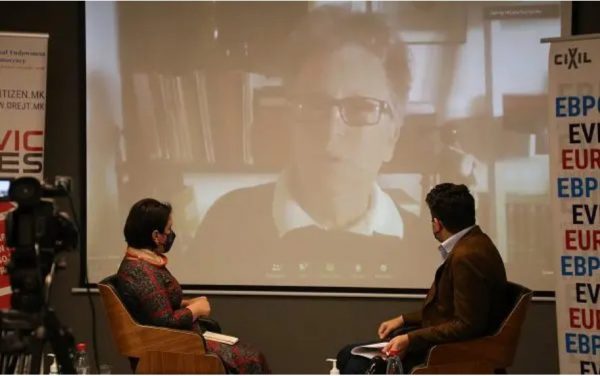“It’s very difficult when it concerns discrimination, in the context of social justice in a country in which it has become very easy to use discrimination. Everyone who comes to power, or is fighting for it, and even civil society, think they know what discrimination is and easily use that word. We need to start from there, because I think that it’s difficult to perceive discrimination”, said university professor Mirjana Najcevska at the panel discussion “Social justice and discrimination: Too many people on the margins of society and politics… Until when?”, organized by CIVIL, which was held on December 11.
“The essence of discrimination is not in the unequal attitude, but in the unequal opportunity to use the rights and opportunities. The question is, not how much we discriminate someone, but how much someone is free, how much rights they have, how much they can protect or practice their rights, are they free to vote for who they want to, do they really enjoy equal rights as the others or not, it’s not about unequal attitude, it’s more complex than that”, said Najcevska.
According to professor Najcevska, the online teaching that is currently being carried out due to the COVID-19 pandemic is seemingly non-discriminatory for all children across the country, but the result is definitely discriminatory.
“The online teaching is seemingly non-discriminatory, for all children, in the entire country, but the result is definitely discriminatory and has a very different effect, children have different circumstances, there are children who don’t have the possibility to follow it, they live in one room with the entire family, there are children who don’t have access to the Internet, to electricity, space and there are situations where one family has more children and they need to follow the online teaching all at the same time”, says Najcevska.
Professor Najcevska added that schools are created for children to be put in relatively equal conditions for conveying knowledge.
“The moment I am doing something like everyone else, it’s not my fault if the result of my action is discriminatory. It’s most frightening when the victim of discrimination doesn’t realize that they are discriminated, we enter a vicious circle of discrimination very often. I want to mention the schools for children with special needs, I am against the existence of such, whereas people are trying to justify them, and in this way the circle of discrimination is closed.
A principal of one such special school once when we argued that such schools shouldn’t exist was convincing me that those children there learn how to go buy bread by themselves. That’s the greatest success, for them to be able to buy bread by themselves! Those children have equal rights like everyone else and the state should provide equal chances and opportunities for all individuals to be able to express their skills and abilities”, highlighted Najcevska.
The professor added that the state must not respond only when there is discrimination, but needs to create conditions for equality, to do its best, in the role of proactive action and to provide equal opportunities.
“The opportunity to use the potentials of an individual, for every individual to be able to have an optimal social status that will ensure not only non-discrimination, but also equality”, added Najcevska.
Putting the blame on the victim of discrimination is the easiest – “that’s their culture, that’s their choice, the Roma like living like that, society gives them opportunities”.
Najcevska says that in regards to gender discrimination, neither those who discriminate, nor the discriminated, manage to perceive the discrimination even when it’s direct, not to mention when it’s indirect discrimination.
“Representatives of certain ethnic communities in Parliament are usually male. They fight for ethnic representation, while they neglect gender representation”, she adds.
Najcevska stresses that the state should not create special criteria for employment of persons with special needs, but should create special conditions and give support to those people who meet the criteria to be in appropriate positions and in the government, both in management and in working structures.
“The obstacles are not in the people with special needs, but in the community. We need to remove the obstacles from the environment so that those people realize their rights and freedoms in the same way.
Cumulative inequality is the most terrible discrimination, it’s one thing to be a Roma and then there is one discrimination, but it’s another being a female Roma, then there is double discrimination, and a third level of discrimination is to be a female Roma with disabilities”, stressed Najcevska.
D.M
camera: Atanas Petrovski
editing: Arian Mehmeti
translation: N. Cvetkovska















